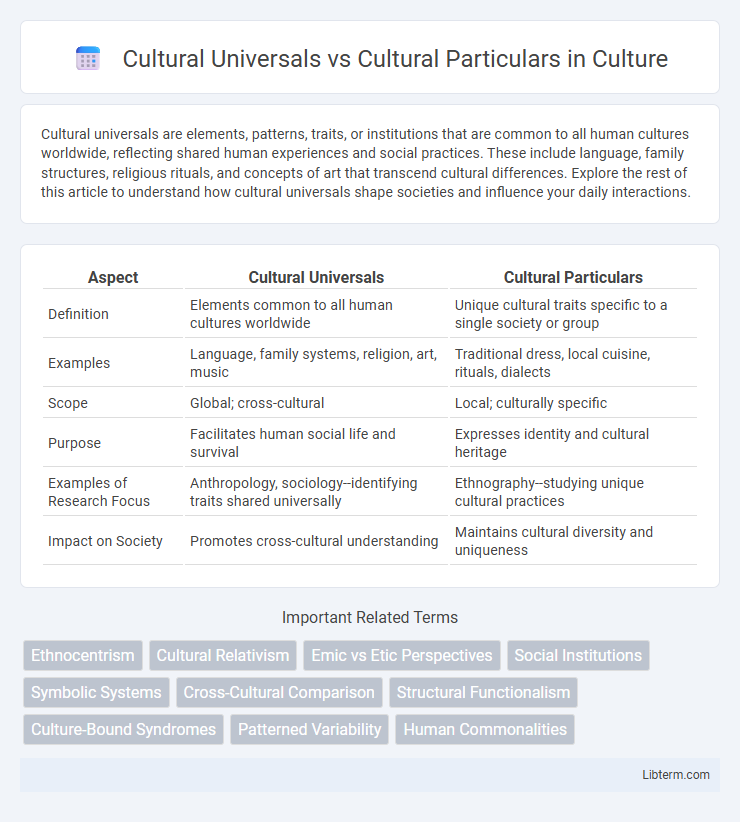Cultural universals are elements, patterns, traits, or institutions that are common to all human cultures worldwide, reflecting shared human experiences and social practices. These include language, family structures, religious rituals, and concepts of art that transcend cultural differences. Explore the rest of this article to understand how cultural universals shape societies and influence your daily interactions.
Table of Comparison
| Aspect | Cultural Universals | Cultural Particulars |
|---|---|---|
| Definition | Elements common to all human cultures worldwide | Unique cultural traits specific to a single society or group |
| Examples | Language, family systems, religion, art, music | Traditional dress, local cuisine, rituals, dialects |
| Scope | Global; cross-cultural | Local; culturally specific |
| Purpose | Facilitates human social life and survival | Expresses identity and cultural heritage |
| Examples of Research Focus | Anthropology, sociology--identifying traits shared universally | Ethnography--studying unique cultural practices |
| Impact on Society | Promotes cross-cultural understanding | Maintains cultural diversity and uniqueness |
Introduction to Cultural Universals and Particulars
Cultural universals refer to elements, patterns, traits, or institutions that are common to all human cultures worldwide, such as language, family structures, and religious beliefs. Cultural particulars are the unique customs, practices, and beliefs that differentiate one culture from another, shaped by geography, history, and social context. Understanding the distinction between cultural universals and particulars provides insight into both the shared aspects of humanity and the diversity that characterizes cultural expression.
Defining Cultural Universals
Cultural universals refer to elements, patterns, traits, or institutions that are common across all human cultures worldwide, such as language, family structures, and rituals. These universals serve as foundational building blocks that shape human social experience and behavior, facilitating communication and cohesion among diverse societies. Understanding cultural universals enables anthropologists to identify shared human characteristics while distinguishing them from culturally specific practices known as cultural particulars.
Understanding Cultural Particulars
Cultural particulars refer to specific customs, traditions, and practices unique to a particular society that differentiate it from others, such as language, cuisine, and rituals. Understanding cultural particulars involves recognizing these distinct elements that shape social identity and influence behavior within a community. This awareness fosters cross-cultural empathy, reduces ethnocentrism, and enhances effective communication in diverse social and professional contexts.
Key Differences Between Universals and Particulars
Cultural universals represent elements, patterns, traits, or institutions common to all human cultures worldwide, such as language, family structures, and religious practices. Cultural particulars refer to the unique adaptations and variations within specific societies, including dialects, customs, and rituals that distinguish one culture from another. The key difference lies in universals being shared human experiences, while particulars reflect localized, culturally specific expressions.
Examples of Cultural Universals
Examples of cultural universals include language, kinship systems, religious rituals, and social norms, all of which appear in every known society. These shared elements provide common frameworks for communication, family organization, belief systems, and behavior regulation across diverse cultures. Understanding cultural universals highlights the fundamental aspects of human experience that transcend specific cultural differences.
Examples of Cultural Particulars
Examples of cultural particulars include specific customs such as Japan's tea ceremony, India's sari clothing, and the American Thanksgiving holiday. These practices are unique to particular societies and reflect distinct historical, social, and environmental influences. Unlike cultural universals, which are shared human traits like language or family structures, cultural particulars highlight the diversity of human cultural expression.
The Role of Cultural Universals in Human Societies
Cultural universals, such as language, family structures, and rituals, serve as foundational elements that facilitate social cohesion and communication across diverse human societies. These universal traits enable shared understanding and collective identity, promoting cooperation and cultural transmission essential for survival and societal development. By providing common frameworks, cultural universals help bridge differences and foster global human connections despite cultural particulars.
How Cultural Particulars Shape Identity
Cultural particulars, including unique customs, traditions, and rituals, critically shape individual and collective identity by providing a sense of belonging and distinctiveness within a society. These localized cultural elements influence language, dress, social norms, and values, reinforcing group cohesion and personal identity formation. Understanding cultural particulars highlights the diversity within universal human experiences, revealing how specific cultural contexts inform self-perception and social interactions.
The Impact of Globalization on Cultural Universals and Particulars
Globalization intensifies the exchange of cultural universals such as language, technology, and social institutions, promoting shared human experiences across diverse societies. At the same time, it challenges cultural particulars by exposing local customs, traditions, and values to external influences and potential homogenization. This dynamic interaction shapes the evolution of global culture, balancing universal human needs with the preservation of cultural uniqueness.
Conclusion: Bridging Universals and Particulars in a Diverse World
Cultural universals such as language, family structures, and religious practices provide a shared framework for understanding human societies, while cultural particulars like specific customs, traditions, and rituals highlight the richness of diversity within that framework. Emphasizing the interplay between universals and particulars fosters cross-cultural empathy and encourages respect for unique identities amid global interconnectedness. Effective cultural competence arises from recognizing common human experiences alongside distinct local expressions, supporting harmonious coexistence in a diverse world.
Cultural Universals Infographic

 libterm.com
libterm.com